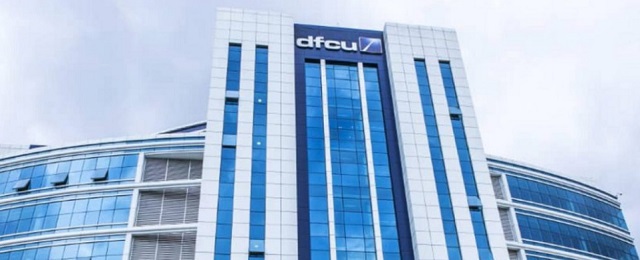
Long serving board chairperson Elly Karuhanga retires in September
Kampala, Uganda | ISAAC KHISA | dfcu Bank has cut dividend payout to its shareholders by 65.5% to Shs17.83 per share, equivalent to Shs 13bn for the year ended Dec.2020 to preserve more capital for any uncertainties that would occur owed to effects of the coronavirus pandemic.
Listed on the Uganda Securities Exchange, dfcu had initially proposed dividend payout of Shs 50.33 per share, equivalent to Shs 37.7bn to its shareholders.
“Due to the pandemic, there’s a lot of volatility,” said Kate Kiiza, Chief Commercial Officer at dfcu Bank told shareholders during the 56th Annual General Meeting (AGM) held on Thursday. “There’s need to be fully prepared for the uncertain times in future and preserve more capital.”
dfcu did not pay dividends for 2019 in response to the Bank of Uganda’s directive to retain more capital as a result of effects of COVID-19. However, the 2020 dividend payout is far lower than the Shs24.69bn paid in 2018.
dfcu recorded sharp drop in profit
dfcu recorded a 67% drop in profit after tax to Shs 24bn last year due to the negative impact of provisions for loans and advances, and impairment of the financial asset as a result of COVID-19 and Non-Performing Loans acquired from the defunct Crane Bank.
The company’s net loan loss provisions increased by 107% from Shs 14bn in 2019 to Shs 30bn in 2020 owed to negative impact of Covid-19 on its customers’ business operations.
Moreover, there was also a higher than anticipated impairment charge on the financial asset of Shs 50bn in 2020 compared to Shs 10bn in the previous year.
However, the lenders’ deposit base grew by 27% from Shs 2. 039tn to Shs 2.595tn during the same period under review. The asset base increased by 18% from Shs 2.958tn to Shs 3.499tn, upheld by strong growth in liquid assets and loans and advances.
dfcu, meanwhile, remains well capitalized with capital ratios of 19.34% and 20.94% for tier one and two capital respectively. Liquidity position remained strong with an average liquid assets ratio above 35%.
Karuhanga opts for retirement
Meanwhile, Elly Karuhanga, the current dfcu Bank board chairperson has opted for retirement effective Sept.30. This comes a year since he resigned as chairman of the Uganda Chamber of Mines and Petroleum (UCMP). Karuhanga was re-elected last year as the bank’s board chairperson for another 2-year term.
He thanked dfcu bank shareholders for entrusting him with the leadership for the last 15 years, gaining more experience and lessons in relation to the banking sector operations.
“I want to tell you that this is an emotional moment for me because dfcu has made such a difference in my life. I am so grateful that you kept giving me the opportunity every time I came for reelection. I must now make room for the young people to come and save our bank. I pledge my full support as I leave,” he said.
Karuhanga, an experienced lawyer, leaves dfcu Bank as its board chairperson at the time the lender has been sued in the United Kingdom over purchase of assets of the defunct Crane Bank. The suit has been filed by the shareholders of the defunct Crane Bank.
Fred Pilser, Non-Executive Director at dfcu Bank, described Karuhanga as a dfcu family broadcaster who will be remembered for his contribution to the advancement and transformation of dfcu.
Future outlook hinges on vaccination, economic recovery
dfcu Bank Managing Director, Mathias Katamba, said the future outlook of the bank’s performance is now hinged on coronavirus pandemic, compliance to the new regulatory environment that comes with the lender being a Domestic Systemic Important Bank, and the projected economic recovery.
He said the bank will continue to help its customers to recover as well as deepen digital financial transactions while undertaking various cost cutting initiatives to boost profit growth.
He, however, said various sectors such as tourism, education and hotel are likely to take one to two years to recover from the effects of COVID-19.
****
 The Independent Uganda: You get the Truth we Pay the Price
The Independent Uganda: You get the Truth we Pay the Price


